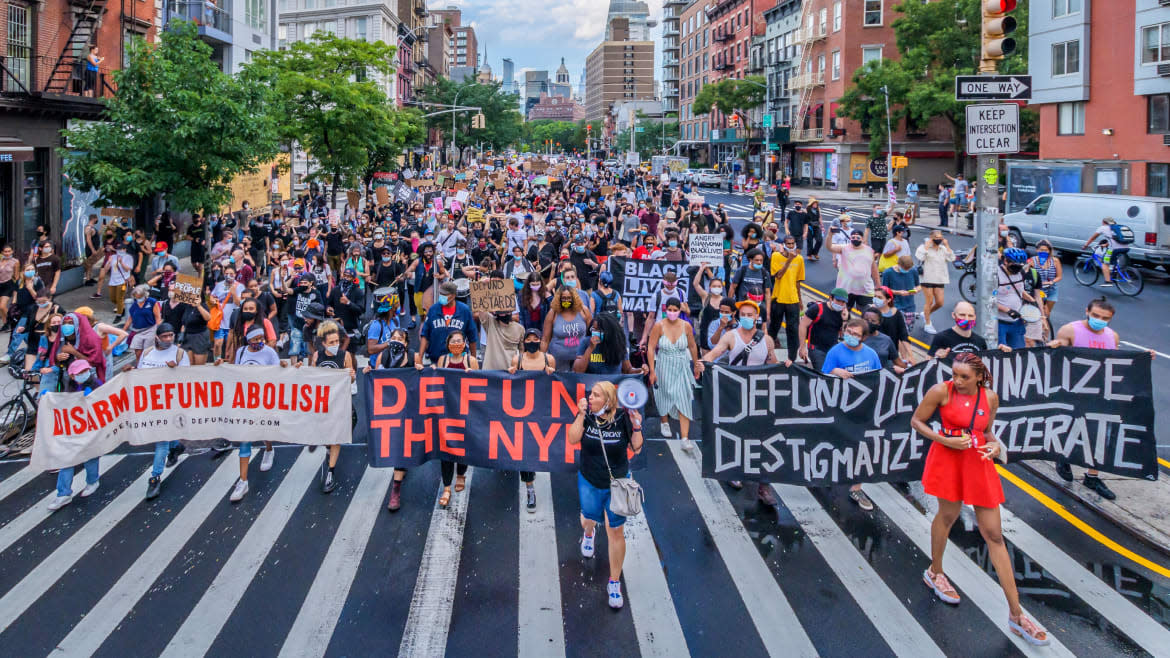Why the 2020 Social Justice Revolutions Failed

- Oops!Something went wrong.Please try again later.
- Oops!Something went wrong.Please try again later.
- Oops!Something went wrong.Please try again later.
- Oops!Something went wrong.Please try again later.
Fredrik deBoer is an unabashed Marxist, long-time grassroots activist, popular Substacker, and occasional contributor to The Daily Beast. And despite my disagreements with him on a host of issues (the virtues of Marxism not least among them) he’s also one of my favorite writers, a prolific scribe whose pugnacious and often very funny prose is armed with a thoughtfulness that’s rarely seen in modern political commentary.
And yet, in his recently released second book, How Elites Ate the Social Justice Movement, his tone is far more empathic and analytical—an impressive feat given the fact he’s plainly frustrated with well-to-do elements of leftist political movements that, in his view, have played to an audience of highly educated activists, academics, and journalists to the detriment of poor and marginalized groups, particularly people of color.
“In 2020, a year that was sold at the time as a moment of unique political foment—as a ‘reckoning’—we saw the American progressive movement drift from the essential to the inconsequential, from the material to the illusory, in much the same way,” deBoer writes in the first chapter of his new book.
Twitter Became Way Too Important to Journalists. Let It Die.
“And then very little happened,” he added. “No major federal legislation would result from the upheaval of 2020. Some cities and states enacted modest criminal justice reforms, but many of these were later quietly rolled back.”
As an illustrative example, he cites the Minneapolis Police Department, which after four of its officers were convicted of murdering George Floyd, was voted by the city council to be abolished and replaced. The council later walked that back grandiose plan and much of the proposed “reform” to “simple budget cuts,” and eventually “an increase in funding to the very department it had recently set about to dissolve.”
I spoke with deBoer in September about his frustrations with the modern social justice movements, why he thinks AOC is no revolutionary but essentially a standard-issue Democrat, and what he considers authentic socialism.
This interview has been edited for style, length, and clarity.
You’ve been a lifelong activist, doing a lot of the boring, often heartbreaking on-the-ground grassroots organizing on issues like gay rights and housing policy, but also 20 years ago, the Iraq War.
Juxtapose your experience with your views on modern social justice activism.
There has been a lot of good progress in terms of basic consciousness-raising and getting people involved, and getting people to donate money, et cetera. But socialism is a practice. It’s something you do, not something that you are. We have a generation of people who consider themselves socialists, who don’t have any experience in that practice.
The way this whole modern socialist thing spread, it spread like a meme. It was mimetic, it was a social contagion. It just became the thing to be if you wanted [to be called] if you were a cultured, arty, left-leaning urbanite. Socialism became the assumed status of people in that sort of cultural milieu.
The problem is that engagement—while it was quite wide, it was very shallow. You have a ton of people who just don’t know what socialism is.
For example, I am constantly annoyed by people who think that they’re talking about socialism when they’re really talking about anarchism. Those are two different things. And “defund the police” was an example of where that sort of muddled thinking hurts.
It’s not realistic to expect everyone to be an activist. And, of course, people who aren’t activists have every right to engage in the conversation. But I would like it if more people who are part of the modern socialist movement, if you can call it that, had experience in organizing to understand how their politics meet the real world.
Rep. Alexandria Ocasio-Cortez, when she first ran for office in 2018, self-identified as a socialist. That label doesn’t come up as often these days with regard to her political identification, but you’ve argued that as a member of Congress, she’s been far more focused on the language of the social justice movement as opposed to class-based socialism.
Yeah, I imagine you read my New York piece about AOC recently. She’s pretty good on the rhetoric. In terms of what she’s talking about, she talks a pretty good game. As I say in that New York piece, I just think her approach to politics is kind of incoherent.
There’s the petty hypocrisies of being a Democratic politician during the Trump era. Arguably the thing that people were most mad about with [Trump] was immigration. A lot of Democrats campaigned on immigration in various ways, at least in blue spaces. The nonprofits fundraised on immigration. “There are kids in cages,” was a constant call. AOC had photographs taken of her at the border, crying over the kids in cages.
Joe Biden Is a Complete Liar on Immigration
The Biden administration’s immigration policy is not really that materially different from the Trump policies. There are a few things that have been tweaked in order to change the optics, but the basic reality of family separation still happens all the time. The basic reality of the conditions under which people are being held has not changed. The Biden administration has made no effort to introduce legislation that would dramatically increase, or even meaningfully increase, the number of immigrants into the country who are not coming on high-skilled worker visas.

Alexandria Ocasio-Cortez stands at the Tornillo-Guadalupe port of entry gate on June 24, 2018 in Tornillo, Texas as a protest against the separation of children from their parents after they were caught entering the U.S. under the administration's zero tolerance policy.
And now they don’t talk about it. AOC doesn’t talk about it. That’s just partisanship.
She [makes] protest votes sometimes, but not other times. She has taken some stances that seem to me to be a pretty basic betrayal of our [socialist] values. But she is someone who uses the language of social justice a lot, which is probably conducive to her position as a representative from an extremely left-leaning district in Queens, but which is not the best approach for a broader social movement that needs to integrate as many people as possible.
You wrote that much of the focus of the modern social justice movement is on linguistics and ever-evolving terminology. What do you mean by that?
After George Floyd’s murder, riots broke out in several major cities. It wasn’t as bad as has happened in American history, but it was not good optics for the movement. And like all riots, they had no tangible goal.
A very large chunk of this country was expressing strong support for Black Lives Matter in the immediate aftermath of the George Floyd killing. And one of the things that started to push that down, and which made it a culture war issue, was the riots. After the riots, in many places on Wikipedia that referred to race riots, the word “riots” was systematically removed and changed to “uprising.”
That’s the kind of thing where you say, “OK, well, that’s great,” if you believe that’s what’s happening. But what does that do for anybody?
On the topic of riots, in 2020 a frequently cited quote from Martin Luther King, Jr. was “riots are the voice of the unheard.”
But, as you note, not only was MLK a lifelong opponent of violence—including riots—but he denounced rioting as counterproductive in that very same speech. You also argued that if someone in 2020 had used the same exact language as MLK to oppose rioting on moral and practical terms, that they’d be branded as “a squish, a police apologist, and an implicit supporter of white supremacy.”
Why do you think modern social justice activists are so drawn to defending riots, or characterizing them as uprisings, or retconning MLK’s actual perspective on riots?
Because a riot is hard to ignore. In other words, when you have a class of people who are having a terribly hard time generating any real-world change, looting some stores and burning some down obviously doesn’t achieve anything of meaning for Black people, but it just looks like something is happening.
Involuntary Treatment Could Have Saved Jordan Neely’s Life
The other thing is people just really don’t want to be associated with the bad side. Privately, personally, or quietly, many people identify a lot of the excesses of the social justice movement to be counterproductive and to be unhelpful. But because it’s the job of conservatives and reactionaries to critique that stuff, they fear that if they critique it themselves, they’re going to look like conservatives.
Politics has become so entirely tribal and so entirely a matter of simply identifying yourself as being part of a particular movement or a milieu that people can’t risk, making exceptions to say, “I’m in favor of the protests, but not the riots,” even though that was always the most sensible point of view.
Allow me to pull out this quote from the book: “Affluent liberals will go on living in Park Slope, in Lincoln Park, and Georgetown, piling their lives with the ephemera of social justice, and they will go on obsessing over the right language to use while the right wing makes policy grabs on issues that have teeth.”
How do you think you can convince affluent or well-educated liberals who fancy themselves activists to focus more on what the right wing does, which is actually pass policy, as opposed to the policing of language and such?
To answer that question, one of the things that you have to do as a preliminary is to recognize that the Democratic Party—including Bernie Sanders, including AOC, including the Squad—have made a strategic decision that they’re always going to talk about taxing the rich. But in order to afford the kind of social state that we want, taxes have to be raised on people who make $125,000-$275,000. But below $400,000—that’s the sort of space the Democrats have essentially adopted as a no-go zone for raising taxes, for a variety of reasons. But one of the biggest one of those reasons is that’s the base of their donor class.
Those people that I’m talking about are people who are all for justice in an abstract sense. But it’s not enough to ask them to support just causes—they have to pay more into the pile if we’re going to afford what we’re talking about.
I want to squeeze the one percent as much as possible, but as much money as they make, it’s just not enough to make something like Medicare For All happen without tax increases on the upper middle class: People like me. People who are merely affluent and not “rich-rich.”

U.S. President Joe Biden delivers remarks on the Child Tax Credit relief payments on July 15, 2021 in Washington, DC.
I have been telling anyone who will listen that the expansion to the Child Tax Credit, which we had for one year because of COVID, and then Joe Manchin killed, is a perfect program for progressive people. It’s actually not that expensive if you look at it compared to some other things. It puts money in the hands of millions of families. It’s means-tested, so it’s not rich people receiving this money because it’s a tax rebate in effect.
It’s also race-neutral on its face, meaning that anyone who’s a poor parent can get the child tax credit. But it’s also, in effect, a racial justice program because of the underlying distribution of poverty in the United States.
New Antifa Book: Only Bougie Wimps Oppose Left-Wing Violence Against Fascists
I wanted to bring up The Washington Post’s review of your book, which was mostly unfavorable. But there’s one particular line where the reviewer wrote that you’re following “a long line of pundits in suggesting without much justification that elite campuses are reliable microcosms of wider societal trends.”
I cite dozens of specific examples in the book. And I should note that the person who reviewed the book is a Ph.D. candidate from Harvard and The Post’s nonfiction book critic. In other words, exactly the kind of person that is being indicted by the book.
In the mid-2000s and 2010s, I was vocal that there was a lot happening on campus that looked really illiberal and unhealthy. And I’m an academic. That’s where I grew up—on a college campus. I spent most of my life [studying and teaching] on college campuses. I care about this kind of space intrinsically, I don’t need for it to be a symbol of everything that’s happening in society.
So I would document all these examples. Oberlin students tried to get professors fired because of their political opinions. Amherst students tried to get their peers formally disciplined by the university for criticizing them. At Wesleyan, a student wrote an op-ed that supported the Black Lives Matter movement in its goals but criticized its strategy. And the response from the students was so violently angry that they attempted to get the 100-year-old-plus campus newspaper shut down.
Well, here’s the thing. Those people go on to become the ruling class of this country.
Kids who go to elite colleges, exclusive colleges, and competitive colleges are going to go on to staff the nonprofits that pressure politicians and write position papers and help direct the policy conversation. They’re going to become members of the elite media. If you look at the biggest newspapers and magazines, there’s an overwhelmingly disproportionate number of people who went to elite colleges in their ranks. These people are gonna stay in academia as professors. They go into government as experts at various departments. They graduate out and staff all of our institutions.
You’ve faced some critics who, despite your left-wing bona fides, have accused you of pandering to the anti-cancel culture right-wing, or having a profit incentive to focus your ire on this particular form of the social justice movement. What would you say to that?
I would say, first of all, the book’s not really selling. So I didn’t do a good job of pandering, if that’s the case.
Look, I’ve focused my fire on the left in my career because I think that the left can and should be reformed to be more effective.
One of the things that’s been left out of discussions of the book, such as The Washington Post review, is that the book is relentlessly sympathetic to these movements. It’s just critical of the means through which they’re trying to achieve their stated goals.
At a book event the other night, I got the same question I’ve gotten from a bunch of people, which is, “I thought the book would be more ’Freddie’ than this. I thought it would be more acerbic. I thought it would be more funny. I thought it would be more mean.”
The problem with that is I could have written it that way, but the point was not to mock anybody. It was to make a sincere attempt to say, “Here’s how these things can be better and different.”
I think conservatism is not redeemable at this point. I don’t criticize conservatives [as often] because I don’t think they’re capable of the reform that the [social justice] movement is capable of. I also don’t want [conservatives] to get any better at doing what they’re doing. Whereas I want the left to be better at being a left-wing movement.
We’ve Erased the Iraq War From Our Memory, but Not the Shame
Near the end of the book, you suggest to social justice activists that they should “talk like human beings again.” Can you go a little deeper?
If you’re using a word like “intersectionality” as a politician, you’re done. You’ve already lost. That is never going to make sense [to people]. If you as a politician do what Alexandria Ocasio-Cortez has done and refer to Black people as “Black bodies,” that’s something that people in your cultural studies class at Bowdoin know what you’re talking about. And people on lefty Twitter will know what you’re talking about. But most people are going to say, “Why is she calling Black people as Black bodies?” It’s weird, it’s alienating, and that sort of thing filters in everywhere. Hillary Clinton’s campaign also had a bunch of forms of engagement in which they sort of used this completely abstract vocabulary to refer to various kinds of oppression.
And that can’t win. Here’s [messaging that] can win. “Child tax credit—no child should live in poverty.” So we’re going to use the tax system and we’re going to give poor families money so that their kids have what they need to survive.
That is a more simple, direct, moral statement that anyone can understand that will always, always, always win out over any kind of [abstract language] about intersectional framework. That stuff is just never going to win.
Get the Daily Beast's biggest scoops and scandals delivered right to your inbox. Sign up now.
Stay informed and gain unlimited access to the Daily Beast's unmatched reporting. Subscribe now.

